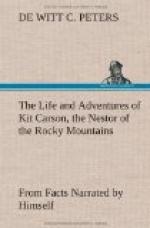cause of their wishing to have his scalp. Never,”
said he, “to his knowledge had he been guilty
of any wrong to their tribe; that, on the contrary,
there were braves among those present, who, if they
turned to their memories, would recognize his face
as that of an old friend in years gone by, and who
could testify to the many acts of kindness which he
had performed in their behalf.” He reminded
them “how that, even now, he had received them
into his camp and treated them with all the hospitality
in his power; and yet they persisted in repaying him
by taking his life.” In the end, he wound
up his discourse by giving peremptory orders for them
to leave his camp, and should any one refuse, he would
be shot. The Indians were completely nonplused,
and not feeling inclined to risk a fight without their
usual accompaniment of a surprise, after saying something
about returning, to which they were answered “that
if they did they would be received by a volley of
bullets,” they departed to join their friends
who were in swarms upon the neighboring hills.
It is supposed that a grand council was called, in
which the proceedings that had transpired in the camp
of the white men were fully reported, and perchance,
many of the braves, in refreshing their memories,
began to recollect some of the daring deeds which
Kit Carson had performed when he lived in their country.
This, doubtless, led them to the conclusion that they
had caught an experienced traveler; for, certain it
was, that afterwards their actions became somewhat
disconcerted and not so rash as they had been.
No sooner had the savages retired from the camp, than
Kit Carson ordered his men to harness their animals
to the wagons so that they could resume their journey.
As the train moved on, the Indians were once more
left behind, although they had, by no means, formed
the idea of allowing the white men to depart in peace.
They were busy concocting some scheme whereby they
could accomplish their ends without loss to themselves.
The muleteers, as they walked beside their teams,
by order of Kit Carson held in one hand their rifles,
while in the other were their whips, which, from time
to time, they were obliged to apply freely to their
animals in order to keep the caravan in compact order.
Mounted on a fine horse, with his rifle and pistols
so adjusted that he could lay his hands on them at
a moment’s notice, Kit Carson rode from one end
of the line to the other, inspiring his men with his
own courage. He felt that upon him was rested
the responsibility of saving the lives of his companions,
and that it was to him they all looked to be rescued
from the perils that surrounded them. As he rode
along, his eyes were busy scanning the prairies in
every direction. Now and then he rested from
this duty as his mind became somewhat relieved, when
he could discover nothing except bands of antelope,
or, here and there, a hungry wolf, who, with his white,
canine looking teeth, seemingly, spoke volumes of




